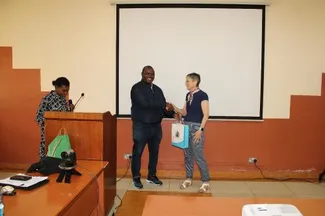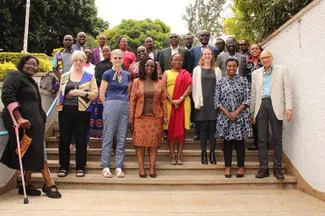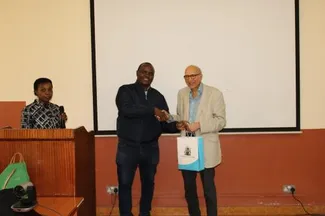Warwick Law School News
Warwick Law School News
The latest updates from our department
Landmark workshop on Law, Development and Environmental Governance
Warwick Law School (WLS) and the Department of Politics and International Studies, in collaboration with the University of Nairobi’s Faculty of Law, hosted a vibrant and intellectually rich workshop on 28 March 2025, exploring “Law and Development Perspectives of Environmental Governance in Africa.” The hybrid event brought together leading academics, practitioners, and students for a day of critical reflection and dialogue on some of the most pressing legal and developmental issues facing the continent.
The workshop commenced with welcoming remarks from Professor Sarah Kinyanjui of the Women, Constitution, and Natural Resources Expert Group (WCNREG), and Professor Collins Odote from the University of Nairobi Faculty of Law. The event was formally opened by Professor Winnie Kamau, who set the tone for a day of thoughtful engagement and academic exchange.
Scholarly Sessions and Debate
The programme featured two sessions of high-calibre academic presentations:
- Session One saw Dr Jeremy Okonjo (Warwick Law School) interrogate the relationship between environmental sustainability and financial systems through the lens of finance law. Professor Ann Stewart followed with an insightful presentation on gender and ageing in African contexts. The session was enriched by incisive commentary from Dr Wambua Kituku and Professor Julie Stewart.
- Session Two featured Professor Gabrielle Lynch (Warwick Politics and International Studies) sharing her research on judicial politics in Africa, particularly judges’ off-bench activities. This was followed by WLS Emeritus Professor Abdul Paliwala’s reflections on development cooperation and environmental justice, offering perspectives from the Global South. Discussants Professor Robert Kibugi and Professor Ben M. Sihanya brought further depth to the conversations.
When asked about the workshop, Warwick Law School's Professor Ann Stewart, who delivered one of the academic presentations told us:
"Reflecting critically on the role of law in development is as important as ever and Warwick Law School can be proud of its contribution to the development of African legal scholarship. This is the message I took away from this important workshop which brought together scholars from across the globe to address issues relating to the pursuit of social economic and environmental justice in Africa. And it is great that Warwick alumni are passing on their knowledge to the next generation of students via Nairobi's law in development course."
Exploring Global Education Pathways
The event also offered a valuable opportunity for students to engage directly with representatives from Warwick.
Caroline Rushingwa, International Liaison Lead for Africa and Africa Chair of BUILA, shared insights on “Why Warwick” during informal discussions with students throughout the day. She highlighted the university’s strong commitment to supporting African students in accessing higher education abroad, discussed pathways to study in the UK, and offered practical advice on applications, scholarships, and academic life at Warwick.
“As an alumna of Warwick’s MA Public Policy, it was both a joy and a privilege to take part in this workshop and engage with students at the University of Nairobi. Events like this not only celebrate the academic partnership between our institutions, but also create a global network of changemakers.”— Caroline Rushingwa, International Liaison Lead for Africa, Africa Chair of BUILA, and Warwick Politics alumna
Her presence added a dynamic international dimension to the workshop, sparking enthusiastic conversations about global learning. Those interested in learning more about opportunities at Warwick can reach out to us at africa@warwick.ac.uk
Strengthening Academic Partnerships
Closing remarks from Professor Winnie Kamau and WLS alumna Dr Agnes Meroka-Mutua underscored the significance of the collaboration between Warwick University and University of Nairobi Faculty of Law. They emphasised the value of sustained academic partnerships in addressing shared environmental and developmental challenges through a legal lens.
The workshop was a testament to the strength of transnational academic collaboration and to the role of universities in shaping more just, sustainable futures. It offered a space not only for scholarly dialogue, but also for mentorship, inspiration, and the forging of global connections.
Here are some photos taken at the workshop.
 |
 |
 |
